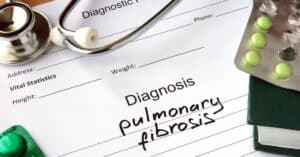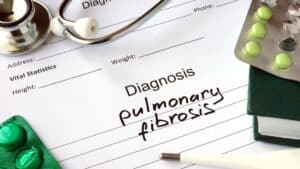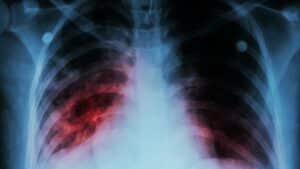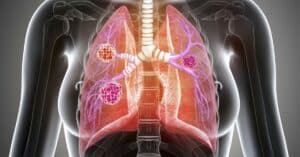Pulmonary fibrosis is a type of chronic lung disease that occurs when lung tissue becomes scarred or damaged. The stiff, thickened tissue obstructs the free passage of oxygen into the bloodstream through the walls of the lungs’ tiny air sacs (alveoli).
Because pulmonary fibrosis is a progressive disease, it will worsen over time. If you’re living with pulmonary fibrosis, you might be wondering what are the final stages of pulmonary fibrosis?
What causes pulmonary fibrosis?
While there are many possible causes of pulmonary fibrosis, such as occupational and environmental factors, autoimmune disorders, infections, genetics and reaction to medications, many times the cause of pulmonary fibrosis is unknown.
When the cause of the disease cannot be identified, pulmonary fibrosis of no known cause is called idiopathic pulmonary fibrosis.
What are the symptoms of pulmonary fibrosis?
For some people, their symptoms progress quickly while others remain mild to moderate for years. People may also experience episodes of symptom flare-ups.
Eventually, people with pulmonary fibrosis will experience worsening symptoms, which is often a sign of rapid disease progression. The most common symptom is feeling increasingly out of breath.
Pulmonary Fibrosis Symptoms:
- Fatigue
- Coughing
- Weakness
- Achy Joints
- Weight Loss
- Shortness of Breath
What are the final stages of pulmonary fibrosis?
Whether you have pulmonary fibrosis or serve as a caregiver to someone with the disease, knowing the signs of the final stages of pulmonary fibrosis makes you more prepared and better informed.
Pulmonary fibrosis is a progressive disease; in other words, it steadily worsens over time. People in the end-stages of progressive lung disease will experience a gradual worsening of their ability breathe.
The nature of the progression of the disease is that after each flare-up, lung function is degraded and does not return to the level it was before the flare-up.
As the disease progresses, the lungs become less efficient. Simple tasks, even as simple as talking or eating, can make someone with pulmonary fibrosis feel out of breath and fatigued.
Having enough oxygen is essential to a properly functioning body. As lung function declines, low blood oxygen levels cause other issues.
If you or your loved one is distressed at having entered the final stages of pulmonary fibrosis, it’s important to share these feelings with your doctor.
Your doctor has resources to help you and your loved one cope with the progression of this challenging disease.
What are the treatment options for people with pulmonary fibrosis?
While pulmonary fibrosis is not curable, it is treatable. Many doctors may prescribe a combination of corticosteroids, medications that suppress the immune system, inhalers, oxygen therapy, nutritional counseling, lung transplant surgery and pulmonary rehabilitation.
Please consult your doctor to find the treatment options that will work best for you and your situation.

Christine Kingsley, APRN is the Health and Wellness Director at the Lung Institute where she focuses on providing helpful online resources for people looking for information on various lung diseases, breathing exercises, and healthy lifestyle choices. She advocates for holistic care that involves working with your doctor to explore all options including traditional and alternative care while focusing on diet and exercise as proactive measures.









